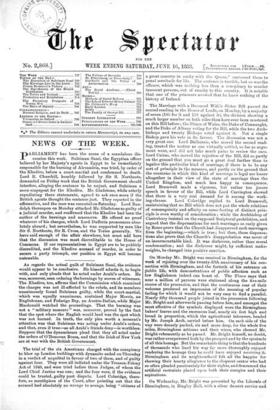The Marriage with a Deceased Wife's Sister Bill passed its
second reading in the House of Lords, on Monday, by a majority of seven (165 for it and 158 against it), the division showing a much larger number on both sides than have ever been mustered on this Bill before ; the Prince of Wales, the Duke of Connaught, and the Duke of Albany voting for the Bill, while the two Arch- bishops and twenty Bishops voted against it. Not a single Bishop gave his vote in its favour. The discussion was not a very great one. Lord Dalhousie, who moved the second read- ing, treated the matter as one virtually settled, so far as argu- ment went, and did not take mach pains to review the case. Lord Cairns, who moved the rejection of the Bill, did so partly on the ground that you must go a great deal farther than to legalise this particular kind of marriage, if there is to be any sort of principle in the measure, and partly on the ground that the countries in which this kind of marriage is legal are looser altogether in their view of the state of marriage than the United Kingdom, and much less happy in consequence. Lord Bramwell made a vigorous, but rather too jocose speech in favour of the Bill, while Lord Carrington showed that there is a very real demand for it among the work- ing-classes. Lord Coleridge replied to Lord Bramwell, maintaining that no Bill which does not put the whole relations of consanguinity and affinity on some footing of distinct prin- ciple is even worthy of consideration ; while the Archbishop of Canterbury insisted on the supposed Scriptural prohibition, and argued that the dispensations for such marriages so early given by Rome prove that the Church had disapproved such marriages from the beginning,—which_ is true ; but then, these dispensa- tions also prove that the Church's disapprobation was never of an insurmountable kind. It was disfavour, rather than moral condemnation ; and the disfavour might, by sufficient make- weights, be changed into positive sanction.


































